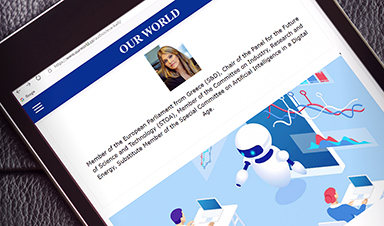In our transforming world, digital technology has the critical mass to push our frontiers and release unlimited potential. As the wave of digital transformation soars high, improving our lives, industries and economies, we must not overlook the risks that technologies and innovations pose on the fairness and cohesion of our societies, and our rights as European citizens.
Through the construction of vast digital infrastructures, which track, monitor and collect personal data at scale, major online platforms are commodifying our data. An entire ecosystem of apps and companies controls huge data flows and ‘treats’ technology users as data suppliers via the imposition of default choice architectures. The current form of ‘computational governance’ in which we are ruled by algorithms and predictive analytics which make use and trade of individual human experiences to produce predictions of human behaviour has largely remained unregulated. We can still be in control of safe AI, trustworthy and complimentary to humans.
AI is at the core of this wave of digitisation; the power it carries must be tamed before it is unleashed in its next form of super intelligence. Manifested in both software and hardware with intelligence expressed in lines of code and powerful automation, it is already being used to solve complex problems, discover patterns or predict traffic, and make suggestions to users. AI is also tested for completely autonomous vehicles, as deep machine learning could make decisions faster, safer and better than people. Progress remains incremental, however the more we advance our understanding and the further we develop this technology, the closer we reach the point where AI leaps from narrow to general, and then super intelligence. Narrow AI is already making simple suggestions and decisions at the service of people; however, the next level of AI sophistication can completely omit humans from the process and reach levels that humans will not be capable to understand or control anymore.
As most of human activity and industry has moved online during the pandemic, and we become more dependent on an increasing amount of digital services, a series of critical questions arise: How can we build data infrastructures that recognise the role of data as a public good? Can we foresee an impartial system of data governance that could reconcile the astonishing potential of these technologies with their significant human downsides? Do we as citizens know that when we use a search engine to find something online, the engine is learning by searching us as well? Does the collection and processing of behavioural data by these technology platforms threaten to dismantle democracy and undermine the rule of law?
To tackle these questions we need to come up with novel, innovative responses, so that we make our future better than the grim outlook predicted in Black Mirror, the popular Netflix series. We have to be aware and cautious in designing the appropriate framework for AI; intelligent systems are used on the pandemic front for rapid COVID diagnosis and prognosis based on AI-enabled CT scanning analysis. AI systems are used now to upgrade our mapping systems, the management of resources, to make our mobility smarter, our agriculture more precise, with predictive maintenance and smart sensors that can contribute to a greener future, saving time, energy, and resources.
As the impact of exponential technologies grows, a new framework is needed in Europe to harness its benefits and mitigate its risks. This framework must be built on ethical principles and binding standards, which elevate people’s trust in AI and ensure that in the digital age, people co-exist with intelligent systems without fearing exclusion, manipulation, oppression or discrimination. Retaining freedom of choice in a human-centric AI that would prevent brain computer interfaces challenging the nature and future of humanity. In contrast to the trends of the Fourth Industrial Revolution towards inequalities and dehumanization, technology and innovation best practices need now to be bent back towards the service of humanity, and Europe could lead as a global rules and standards setter for the Fifth Industrial Revolution….
 By Eva Kaili – Member of the European Parliament from Greece (S&D), Chair of the Panel for the Future of Science and Technology (STOA), Member of the Committee on Industry, Research and Energy, Substitute Member of the Special Committee on Artificial Intelligence in a Digital Age.
By Eva Kaili – Member of the European Parliament from Greece (S&D), Chair of the Panel for the Future of Science and Technology (STOA), Member of the Committee on Industry, Research and Energy, Substitute Member of the Special Committee on Artificial Intelligence in a Digital Age.
News
Drug-Coated Neural Implants Reduce Immune Rejection
Summary: A new study shows that coating neural prosthetic implants with the anti-inflammatory drug dexamethasone helps reduce the body’s immune response and scar tissue formation. This strategy enhances the long-term performance and stability of electrodes [...]
Scientists discover cancer-fighting bacteria that ‘soak up’ forever chemicals in the body
A family of healthy bacteria may help 'soak up' toxic forever chemicals in the body, warding off their cancerous effects. Forever chemicals, also known as PFAS (per- and polyfluoroalkyl substances), are toxic chemicals that [...]
Johns Hopkins Researchers Uncover a New Way To Kill Cancer Cells
A new study reveals that blocking ribosomal RNA production rewires cancer cell behavior and could help treat genetically unstable tumors. Researchers at the Johns Hopkins Kimmel Cancer Center and the Department of Radiation Oncology and Molecular [...]
AI matches doctors in mapping lung tumors for radiation therapy
In radiation therapy, precision can save lives. Oncologists must carefully map the size and location of a tumor before delivering high-dose radiation to destroy cancer cells while sparing healthy tissue. But this process, called [...]
Scientists Finally “See” Key Protein That Controls Inflammation
Researchers used advanced microscopy to uncover important protein structures. For the first time, two important protein structures in the human body are being visualized, thanks in part to cutting-edge technology at the University of [...]
AI tool detects 9 types of dementia from a single brain scan
Mayo Clinic researchers have developed a new artificial intelligence (AI) tool that helps clinicians identify brain activity patterns linked to nine types of dementia, including Alzheimer's disease, using a single, widely available scan—a transformative [...]
Is plastic packaging putting more than just food on your plate?
New research reveals that common food packaging and utensils can shed microscopic plastics into our food, prompting urgent calls for stricter testing and updated regulations to protect public health. Beyond microplastics: The analysis intentionally [...]
Aging Spreads Through the Bloodstream
Summary: New research reveals that aging isn’t just a local cellular process—it can spread throughout the body via the bloodstream. A redox-sensitive protein called ReHMGB1, secreted by senescent cells, was found to trigger aging features [...]
AI and nanomedicine find rare biomarkers for prostrate cancer and atherosclerosis
Imagine a stadium packed with 75,000 fans, all wearing green and white jerseys—except one person in a solid green shirt. Finding that person would be tough. That's how hard it is for scientists to [...]
Are Pesticides Breeding the Next Pandemic? Experts Warn of Fungal Superbugs
Fungicides used in agriculture have been linked to an increase in resistance to antifungal drugs in both humans and animals. Fungal infections are on the rise, and two UC Davis infectious disease experts, Dr. George Thompson [...]
Scientists Crack the 500-Million-Year-Old Code That Controls Your Immune System
A collaborative team from Penn Medicine and Penn Engineering has uncovered the mathematical principles behind a 500-million-year-old protein network that determines whether foreign materials are recognized as friend or foe. How does your body [...]
Team discovers how tiny parts of cells stay organized, new insights for blocking cancer growth
A team of international researchers led by scientists at City of Hope provides the most thorough account yet of an elusive target for cancer treatment. Published in Science Advances, the study suggests a complex signaling [...]
Nanomaterials in Ophthalmology: A Review
Eye diseases are becoming more common. In 2020, over 250 million people had mild vision problems, and 295 million experienced moderate to severe ocular conditions. In response, researchers are turning to nanotechnology and nanomaterials—tools that are transforming [...]
Natural Plant Extract Removes up to 90% of Microplastics From Water
Researchers found that natural polymers derived from okra and fenugreek are highly effective at removing microplastics from water. The same sticky substances that make okra slimy and give fenugreek its gel-like texture could help [...]
Instant coffee may damage your eyes, genetic study finds
A new genetic study shows that just one extra cup of instant coffee a day could significantly increase your risk of developing dry AMD, shedding fresh light on how our daily beverage choices may [...]
Nanoneedle patch offers painless alternative to traditional cancer biopsies
A patch containing tens of millions of microscopic nanoneedles could soon replace traditional biopsies, scientists have found. The patch offers a painless and less invasive alternative for millions of patients worldwide who undergo biopsies [...]





















